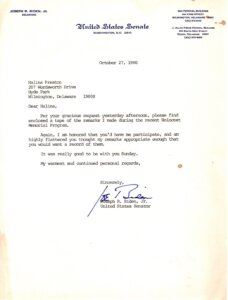Joe Biden, circa 1987. Photo by Getty Images
In the swirling debate over Joe Biden’s affections for Israel and the Jews, I recall two survivors in Delaware whose activism helped to mold the future president’s understanding of the Holocaust — my parents.
They were already Biden’s constituents when he served as a New Castle County councilman in suburban Wilmington while still in his 20s. My father, George E. Preston, was a French-educated DuPont Co. engineer who had survived Auschwitz and Buchenwald. My mother, Halina Wind Preston, was a Jewish educator who had survived 14 months in the sewers of German-occupied Lviv in 1943-44, hidden by Polish Catholic sewer workers.
In 1965, the year Biden graduated from the University of Delaware, my father made worldwide news testifying at the Auschwitz war-crimes trials. “Wilmington Man Tells of Stomping by Nazi,” blared the six-column headline in The Philadelphia Inquirer story of March 5, 1965, from Frankfurt. Three days later, “SS Tattoo 160581 Back Here After Auschwitz Testimony” was the headline in the Wilmington Evening Journal.
Five years later, when Biden was elected to the county council, my mother was making frequent appearances as Delaware’s eloquent spokeswoman for the victims and survivors of the Holocaust. During his upstart campaign for the U.S. Senate before his election in November 1972, his first wife, Neilia Hunter Biden, carried their infant daughter, Amy, into our split-level home on Wordsworth Drive in Hyde Park. Tragically, weeks later they died in a traffic collision a few miles away.
Biden had been remarried to Jill Biden and was already established in the Senate when my mother invited him to speak at a 1980 ceremony at a newly erected Holocaust monument in Wilmington. My father served on the monument committee and delivered the main address, and I was among 11 children of survivors who lit memorial candles. Biden sent my mother a personal note thanking her for inviting him, and enclosed an audiocassette of his remarks.

“There obviously is no joy in remembering what has happened,” the 37-year-old Biden told the audience. “There’s no joy in recollecting the fact that a civilization that was 2,000 years old — and I speak of the German civilization — could produce a leader, could produce a circumstance, could produce a people, could produce a situation that would lead to the most outrageous and hideous act that man has ever visited upon man.”
“You are here today,” he continued, “to tell good Christians like me that that is what we produced. You are here today to tell all the world that what has happened can happen again. You are here today to tell anyone who’d bother to listen — and this monument stands here daily to remind an entire civilization — that man’s inhumanity to man has not ceased, that man’s inhumanity to man will only be checked as a consequence of us continuing to call to mind what we’ve done, and what has happened.”
Perhaps Biden was thinking of my parents when he paused to consider one powerful word.
“Survivors,” he said. “Survivors who have decided not just to survive, but to lead. Survivors who have decided not just to survive, but not to forget. And survivors who have been in the forefront of every single movement that has been called humane that mankind has been associated with. Survivors who have produced the State of Israel. Survivors that have been involved with the Civil Rights Movement in this country. Survivors who not only have survived, but have made things better. That’s what your heritage is. That’s what I am so proud to be associated with.”
His remarks showed that he understood his role as a leader in the generation that came after the war.
“Unless we make a firm commitment, your generation to educate mine, to not forget what happened, you can rest assured it will happen. It can happen anywhere, it can happen any time. Where was there a more glorious civilization than existed in the middle Thirties in Germany? Where was there greater technology? Where was there greater achievement?”
After my mother died in 1982, Biden again displayed emotional depth in his thoughts for a brochure for a garden she had started in front of Wilmington’s Jewish Community Center honoring “Righteous Gentiles” who saved Jews during the Holocaust, the first memorial of its kind in the United States. My mother dedicated two trees to the sewer workers who saved her; other survivors in Delaware also planted trees honoring their rescuers. One couple living in Arden, Del., was honored with a tree for saving two Jewish boys in the Netherlands.
“One way to make certain that the moral darkness of another Holocaust never again descends upon the world is to remember those whose humanity transcended that evil exercise in genocide, often at the risk or the loss of their own lives,” Biden wrote. “If we are to prevent a future Holocaust, we must be able to believe that men and women of all faiths are capable of perceiving evil and willing to resist it at all costs. The Garden of the Righteous Gentiles, as a memorial to those who displayed such moral and personal courage in the face of the Holocaust, is a living justification of that necessary belief.”
The two Wilmington monuments that inspired Joe Biden’s words — reminders of both evil and good — will remain as monuments to the memory of my parents and their fellow survivors. To his everlasting credit, Biden’s dedication to learning lessons from the Holocaust will be an enduring aspect of his legacy.
